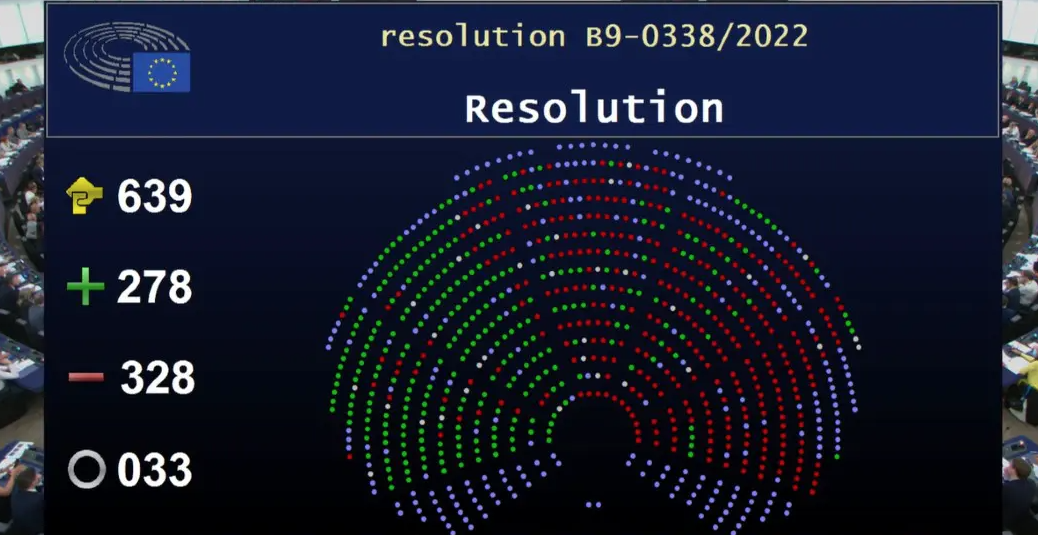Gas and nuclear will be recognised as sustainable energy sources, important for the transition, with certain conditionalities. With taxonomy, the EU wanted to create a tool that would serve as a compass for investors, not just Europeans. Greens: "Today is a dark day for climate and energy transition"
The duel on green taxonomy ends 328 to 278
(Sustainabilityenvironment.com) – By 50 votes fails the attempt to blitz against the green taxonomy that includes gas and nuclear. The ‘no’ vote failed to secure a large enough cross-party majority to block the approval of the European Parliament for the second delegated act proposed by the Commission earlier this year.
The result of the vote
Strasbourg, in the plenary session of 6 July, rejected by 328 votes the motion calling for the scrapping of the list of investments considered sustainable by the EU. Only 278 MEPs voted to remove gas and atoms from the green taxonomy, and 33 abstained. The result of the vote confirms the predictions of the eve: the European Abacus Machine reported a gap of about 60 votes.
Read also Gas in green taxonomy, contraries prepare lawyers
Left and Green groups voted (almost) together against gas and atom. A few more defections among the social-democrats, while few among Renew and the popular have said no to this green taxonomy. At the end of the vote, some activists in the dovecote formed the inscription “Betrayal”, betrayal, with their jerseys.

What is green taxonomy
Green taxonomy is a key measure for deciding Europe’s energy future. It is a list of energy sources that the EU decides to consider sustainable, and therefore to encourage. The “green” source label attracts more investment, public but especially private. Obviously, since the capital resources are not infinite, giving way to investors to bet also on gas and nuclear means reducing the resources available for renewables.
For critics, it is a move that will slow down the energy transition and bind Europe to more emissions in the coming decades – in the case of gas – and to rely on technology, such as nuclear technology, which has some criticality on the times of realization and can have some on the management of the slags. For the front of the no that went from Left to the EPP, promoting gas made little sense before the Russian invasion of Ukraine and has even less after the outbreak of war.
Reactions to the vote
In recent days, some of the highest EU officials had tried to reassure opponents of gas and nuclear in green taxonomy. “I believe that investments will still go to renewables for gas costs and because nuclear is increasingly expensive to implement,” said Frans Timmermans, vice-president of the Commission. “In my opinion, calculation and reason should make us choose renewables, but decisions are not always rational”.
“For me it is better to have clear rules, a clear conditionality on private investment in gas and nuclear to ensure that we move towards our shared ambitions of net-zero” the statement by Financial Services Commissioner Mairead McGuinness during the debate in Strasbourg yesterday. “There will be no greenwashing”, he then promised, “but it will be very clear to investors what investments are contained in financial products”.
“Today is a dark day for the climate and the energy transition” is the bitter comment of Bas Eickhout of the Greens. “We are sending a disastrous signal to investors and the rest of the world: the EU now recognizes fossil gas and nuclear energy as sustainable investments. Paving the way for this delegated act, the EU will have unreliable and “greenwashed” conditions for green investments in the energy sector”.
“Today’s vote is a painful and shameful setback for Europe as a global leader in the fight against climate change” accuses Paul Tang of S&D. “By approving the Commission’s plans to define gas and nuclear power as sustainable, the EU is institutionalizing greenwashing on an unprecedented scale. As a climate leader, Europe is in danger of becoming a laggard in terms of climate, given that not even Russian taxonomy labels gas as sustainable. Europe’s unscientific project must not be an invitation to the countries of the world to reduce their climate ambitions”.













